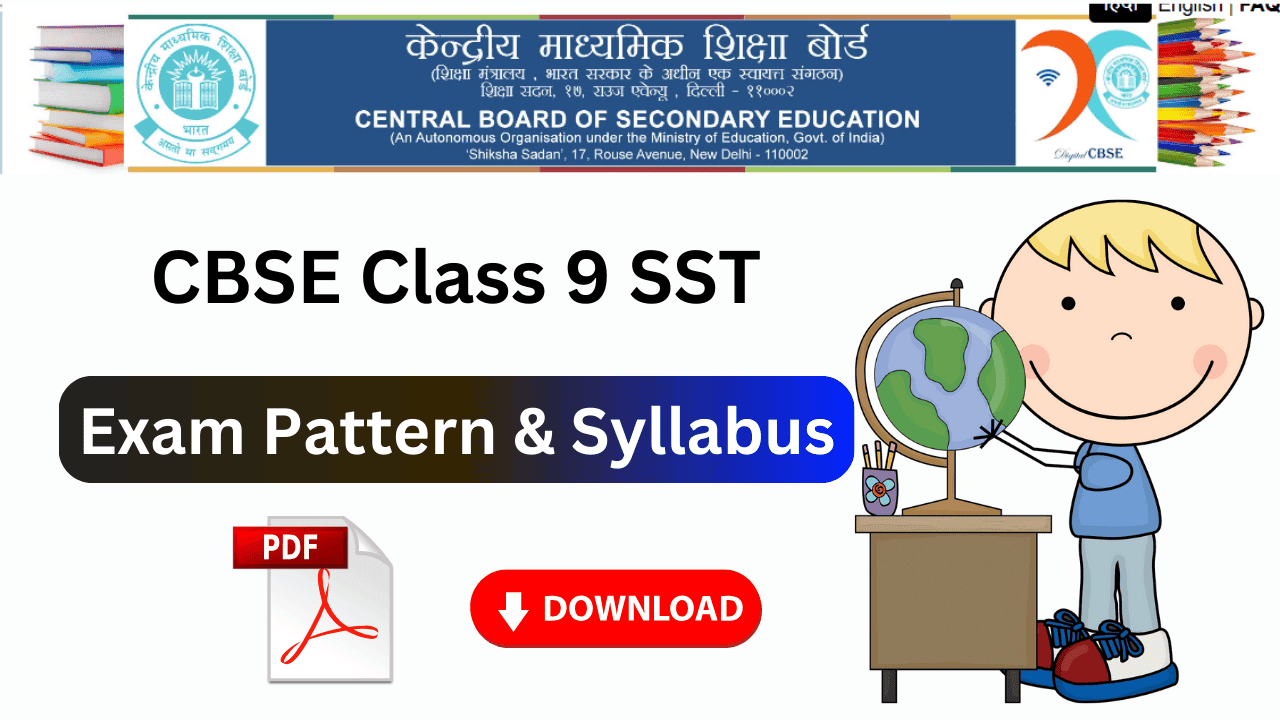Latest CBSE Class 9 Social Science Syllabus 2025-26 – Get the official syllabus with a chapter-wise breakdown, marking scheme, and expert study tips. Download the official PDF at the end!
Overview of CBSE Class 9 SST Syllabus 2025-26
The Class 9 CBSE syllabus for Social Science (SST) is crucial for board exams and sets the foundation for higher classes. The 2025-26 syllabus includes competency-based questions, increased focus on application-based learning, and internal assessments.
| Board | CBSE |
| Class | 9 |
| Session | 2025-26 |
| Subject | SST |
| Content-Type | Syllabus/Curriculum |
| Official Website | https://cbseacademic.nic.in |
CBSE Class 9 Social Science Syllabus (2025-26)
Total Marks: 80 (Theory) + 20 (Internal Assessment) = 100 Marks
Course Structure
1. History – India and the Contemporary World-I (20 Marks)
Section I: Events and Processes
| Chapter | Topic | Marks |
|---|---|---|
| 1 | The French Revolution | 18 + 2 (Map) |
| 2 | Socialism in Europe & Russian Revolution | |
| 3 | Nazism and the Rise of Hitler |
Section II: Livelihoods, Economies & Societies
| Chapter | Topic | Marks |
|---|---|---|
| 4 | Forest Society & Colonialism (Interdisciplinary Project) | 5 (Internal) |
| 5 | Pastoralists in the Modern World (Periodic Assessment Only) | 6 |
2. Geography – Contemporary India-I (20 Marks)
| Chapter | Topic | Marks |
|---|---|---|
| 1 | India – Size & Location | 17 + 3 (Map) |
| 2 | Physical Features of India | |
| 3 | Drainage | |
| 4 | Climate | |
| 5 | Natural Vegetation & Wildlife (Map Only) | |
| 6 | Population |
Interdisciplinary Project: Linked with History (Ch.4) – 5 Marks (Internal)
3. Political Science – Democratic Politics-I (20 Marks)
| Chapter | Topic | Marks |
|---|---|---|
| 1 | What is Democracy? Why Democracy? | 20 |
| 2 | Constitutional Design | |
| 3 | Electoral Politics | |
| 4 | Working of Institutions | |
| 5 | Democratic Rights |
4. Economics (20 Marks)
| Chapter | Topic | Marks |
|---|---|---|
| 1 | The Story of Village Palampur (Periodic Assessment Only) | 20 |
| 2 | People as Resource | |
| 3 | Poverty as a Challenge | |
| 4 | Food Security in India |
Map Work (History & Geography)
History Map Topics
- French Revolution: Bordeaux, Paris, Nantes, Marseille (France)
- World Wars:
- WWI: Germany, Austria-Hungary, France, UK, USA
- WWII: Germany, Italy, Japan, USSR, USA
Geography Map Topics
- Physical Features:
- Mountain Ranges (Himalayas, Aravalli, Western Ghats)
- Rivers (Ganga, Narmada, Godavari)
- Plateaus (Deccan, Chota Nagpur)
- Climate & Population:
- Monsoon winds, Population density (Highest: UP, Lowest: Mizoram)
Internal Assessment (20 Marks)
| Component | Description | Marks |
|---|---|---|
| Periodic Test | Pen-paper test | 5 |
| Multiple Assessment | Quiz, Debate, Project, Viva | 5 |
| Subject Enrichment | Interdisciplinary Project (Disaster Management) | 5 |
| Portfolio | Assignments, Reflections, Participation | 5 |
Learning Outcomes (Key Highlights)
History
- French Revolution: Impact on Europe, causes of revolutions.
- Russian Revolution: Lenin vs. Stalin, philosophers' role.
- Nazism: Treaty of Versailles, Hitler’s genocide.
Geography
- India’s Location: 82.5°E longitude, climate diversity.
- Physical Features: Formation of Himalayas, river systems.
- Population: Density factors, uneven distribution.
Political Science
- Democracy: Comparison (India vs. North Korea).
- Constitution: Drafting process, fundamental rights.
Economics
- Village Economy: Farming vs. non-farming activities.
- Poverty & Food Security: Government schemes, Green Revolution.
Prescribed Books (NCERT)
- History: India & the Contemporary World-I
- Geography: Contemporary India-I
- Political Science: Democratic Politics-I
- Economics: Economics
- Disaster Management: Together Towards a Safer India
Best Study Tips for CBSE Class 9 SST
- Balance the Subjects: Divide study time equally among History, Geography, Political Science, and Economics (20 marks each), with extra focus on weaker areas.
- Daily Revision: Spend 1-2 hours daily—30 minutes per subject, plus 15-20 minutes on map work.
- Stick to NCERT: Use NCERT textbooks as your primary resource—they cover the full syllabus and align with exam questions.
- Map Practice: Master 5-10 map items daily (e.g., Paris, Deccan Plateau) for 5 easy marks.
- Sample Papers: Solve past papers to get used to question types (MCQs, long answers) and manage 3 hours effectively.
Download CBSE Class 9 SST Syllabus 2025-26 PDF
Click the button below to download the official CBSE syllabus PDF for 2025-26.
📂 Download CBSE Class 9 SST Syllabus PDF
🔍 Related Guides
CBSE Class 9 English Language & Literature Syllabus 2025-26
CBSE Class 9 Maths Syllabus 2025-26
CBSE Class 9 Computer Applications Syllabus 2025-26
CBSE Class 9 Science Syllabus 2025-26
CBSE Class 9 Hindi A Syllabus 2025-26
CBSE Class 9 Hindi B Syllabus 2025-26
Stay Updated!
Join our Telegram/WhatsApp group for CBSE updates, free notes, and exam tips!
Bookmark this page & keep revising smartly!
Frequently Asked Questions
How are the 80 theory marks distributed?
Each subject—History, Geography, Political Science, and Economics—carries 20 marks, including map work (2 for History, 3 for Geography).
Which topics are not in the final exam?
History: Pastoralists in the Modern World (Periodic Assessment only).
Economics: The Story of Village Palampur (Periodic Assessment only).
History Ch. 4 (Forest Society) is for the interdisciplinary project (internal).
How much weightage does map work have?
Map work is worth 5 marks (2 for History, 3 for Geography), making it an easy scoring area.
Is the syllabus tough compared to Class 8?
It’s more detailed (e.g., revolutions, democracy), but manageable with regular study and NCERT focus.
Are NCERT books enough for preparation?
Yes, NCERT books for History, Geography, Political Science, and Economics cover the entire syllabus.
